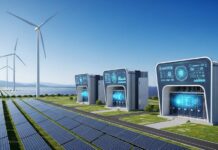There are major ups and downs in Great Britain, France lumbers forward affected to a degree by events the other side of the Channel, and in the midst of all this we have our conference in Le Havre in three weeks time that allows those events to be placed in their wider context.
As we have said many times, we did not choose Le Havre by accident. It is the deep-water logistics hub for three of the six offshore wind farms currently planned for France, and the announced site for the AREVA/ADWEN 8Mw offshore wind turbine factories. Our exhibitor list (and in fact our visitor list too) is a reflection of the industry interest in what we are offering, but to us it is not the strong exhibitor list that is the most interesting, but the “not-exhibitor” list.
We need to underline that Le Havre is the centre for three of the six planned French offshore wind farms. The AREVA/ADWEN turbine factory is supposed to be there. EDF-EN is involved in two out of the three in the region. Yet AREVA/ADWEN, EDF-EN, and the Normandy Region are all absent from the exhibitor list. A possible explanation is that no certainty yet attaches to those factories and that the absentees know that if they attend, they will find it hard to avoid awkward questions. Our guess is that those questions are going to get asked anyway and that it is better to face up to them, than try to avoid them. They aren’t exactly going to go away.
The other moderately hot topic that affects both the UK and France is the probable refusal of planning consent for the proposed 940Mw Navitus Bay offshore wind farm near Bournemouth. We commented extensively on that in an article published last week. The project is 50% owned by EDF-EN, and it was widely expected that Alstom would be the turbine supplier. If the refusal is confirmed, as we expect, that is news that EDF could do without, but really awful news for Alstom. They badly needed that order to keep their St. Nazaire and Cherbourg factories in work. Five turbines for the USA is all that they have to deliver in the short-term.
Our Le Havre event is regional, albeit with the national tinge inevitable in this industry. Our aim was never to make it a massive jamboree. The number of exhibitors is just 30 and some 300 visitors will come through the doors. What we want is that it be held in a relaxed and positive atmosphere – a place where people can meet and talk business quietly. Our BtoB system makes that easier and is open to visitors as well as exhibitors. One of the things that has gone badly wrong in France is that there was much too much hype at the time that the first projects were announced. Talk of 30,000 new jobs was always moonshine – the UK talks of just 18,000 for its much bigger industry. The inevitable result was that disillusion set in, particuarly for the smaller companies, when nothing concrete happened. One of our aims is to help move that conversation forward – better to manage expectations, by reducing them.
Being Franco-British we also believe in co-operation. France has a bad reputation for being overly nationalist in its procurement policy. While substantially justified, we are less clear that Germany is any better, but is just more discrete. The UK does not start from such an instinctively protectionist position, but has no intention either of allowing imports to account for too much of the added-value to be derived from its thriving marine renewables industry. Talk is all of 50%, but even then, unlike in France, there has been little or no public cash thrown at creating a national industry in Britain. Mojo Maritme has a French subsidiary that we welcome as an exhibitor; 4C Offshore is venturing across the Channel for a second time; BVG Associates are sending a Senior Associate as a speaker; numerous visitors are expected from the wider European shipping industry. What this tells us is that non-French companies can win business in France (Natural Power has just won a major contract there), but that the successful will have to play by French rules. That there are so many visitors from the shipping industry is no real surprise. We have given the sector more focus than is the case elsewhere, and France is short on national supply, leaving the door wide open to others.
































